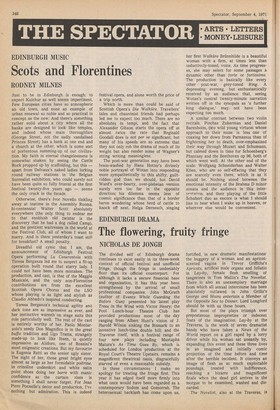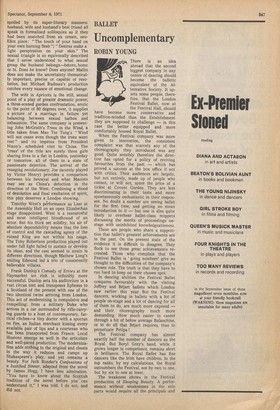EDINBURGH DRAMA
The flowering, fruity fringe
NICHOLAS DE JONGH
The divided self of Edinburgh drama continues to exist easily in its three-week context of official festival and unofficial fringe, though the fringe is undeniably finer than its official counterpart. For although it lacks a secure financial base and organisation, it has this year been strengthened by the arrival of small professional companies; John McGrath (author of Events While Guarding the Bofors Gun) presented his latest play Trees in the Wind with Victor Henry; the Pool Lunch-hour Theatre Club has provided productions most of the day ranging from Albert Hunt's vision of J. Harold Wilson sinking the Bismark to an inventive lunch-time double bill; and the Traverse itself, with a festival range of four new plays including Mustapha Matura's As Time Goes By, which is scheduled for London production at the Royal Court's Theatre Upstairs, remains a magnificent theatrical oasis, disgracefully starved of even a reasonable subsidy.
In these circumstances I make no apology for treating the fringe first. This year it has edged itself more firmly into what once would have been regarded as a contemporary Sodom and Gomorrah. The heterosexual backlash has come upon us,
fortified, in new dramatic manifestations. the buggery of a woman and an apricotscented vagina in Trevor Griffiths's Apricots, artifical male organs and fellatio in Lay-by, female flesh smelling of tangerines in Tom Mallin's The Novelist. There is also an unexemplary marriage from which all sexual intercourse has been absolutely outlawed in John Grillo's George and Moira entertain a Member of the Opposite Sex to Dinner. Lord Longford should be with us these hours, But most of the plays triumph over preposterous improprieties or indecent feats of the imagination. Lay-by at the Traverse, is the work of seven dramatist hands who have taken a News of the .World report on a girl raped by a lorry driver while his woman sat uneasily by, expanding this event and these three lives in an imagined and initially comic projection of the time before and time after the terrible incident, It conveys an image of flesh as so much exploitable poundage, treated with indifference, reaching a bizarre and magnificent finale when the dead girl arrives in the morgue to be examined, washed and discarded.
The Novelist, also at the Traverse, is
spoiled by its super-literary manners: husband, wife and husband's best friend all speak in formalised soliloquies as if they had been snatched from an ornate, neoEliot piece : "The touch of your hand on your own burning flesh "; "Desires make a light perspiration on your skin." The sexual triangle is so equivocally described that I never understood to what sexual group the husband belongs—hetero, homo or bi. Does he know? Does anyone? Mallin does not make the uncertainty thematically important, precise or capable of resolution, but Michael Rudman's production catches every nuance of emotional change.
The wife in Apricots is the still, sexual point of a play of greater dramatic power; a three-scened garden confrontation, erotic to the point of 80 degrees over, it supplies a picture of a marriage in failure yet balancing between sexual bathos and exhaustion. The same company is presenting John McGrath's Trees in the Wind, a title taken from Mao Tse Tung's "Wind will not cease even though the trees want rest" and its impetus from President Nixon's scheduled visit to China. The 'trees' of the title are surely three girls sharing lives in a flat in London, yesterday or tomorrow, all of them •in a state of passionate dejection. The arrival of the reneging revolutionary, Joe (acutely played by Victor Henry) provides a comparison between his betrayal and what Maoists may see as China's defection in the direction of the West. Combining a ttood of desolation and final exultation of spirit, this play deserves a London showing.
Timothy West's performance as Lear at the Assembly Hall on an open Elizabethan stage disappointed. West is a resourceful and most intelligent bloodhound of an actor. But his thick set solidity, his air of absolute dependability means that the loss of control and the cascading agony of the ruined King are not within his range. The Toby Robertson production played out under full light failed to sustain or develop its ideas, and the cast seemed to strain in different directions, though Mathew Long's smiling Edmund led a trio of consistently believable villains.
Frank Dunlop's Comedy of Errors at the Haymarket ice rink is infinitely more successful. Dunlop sets his auditorium in a vast circus tent and transposes Ephesus to a Scotland of the present with one of the two identical twins arriving from London. This act of modernizing is compulsive and compelling: from a military Duke who arrives in a car surrounded by rifle-carrying guards to a host of contemporary, farcical cliches—a tiny doctor with a sporran on fire, an Italian merchant kissing every available pair of lips and a courtesan who has been transported from France. Local illusions emerge as well in the articulate and well-paced production. The moderniza tion adds nothing to the original and cheats in the way it reduces and camps up Shakespeare's play, and yet remains a beauty. For Jack Ronder's Confessions of a Justified Sinner, adapted from the novel by James Hogg, I have less admiration. "You have to know about the Scottish tradition of the novel before you" can understand it," I was told. I do not, and did not.



































 Previous page
Previous page